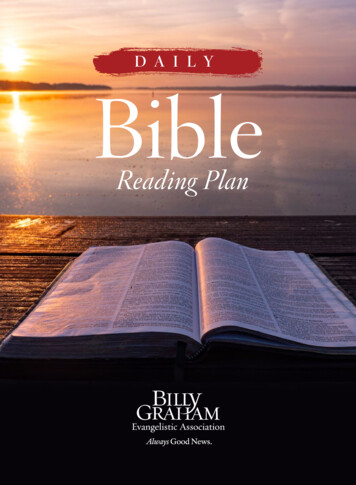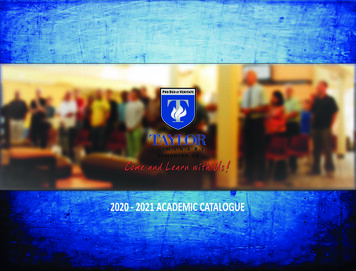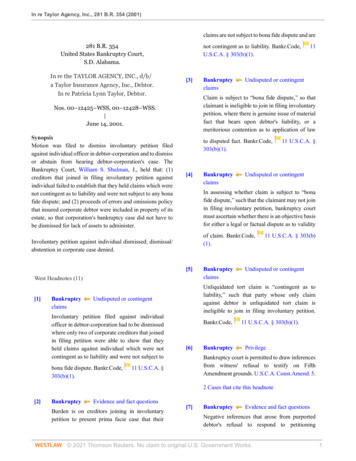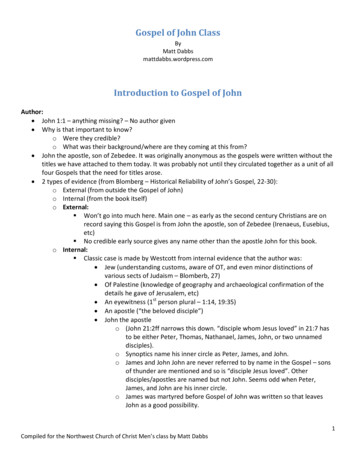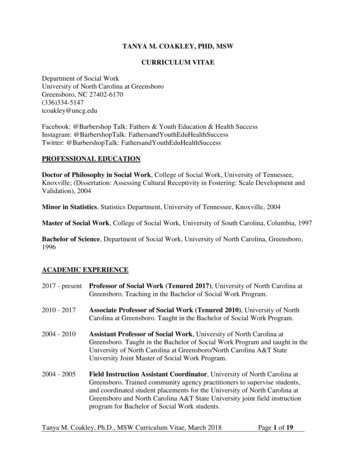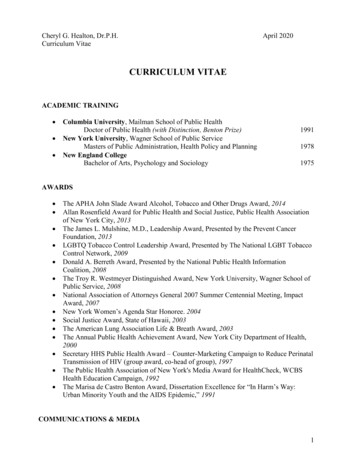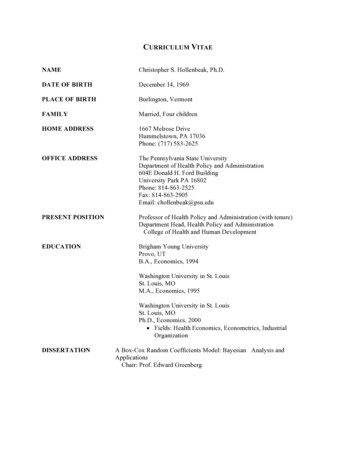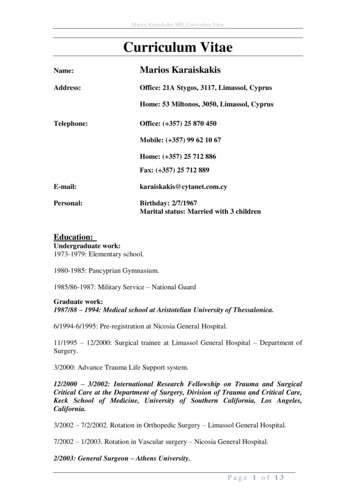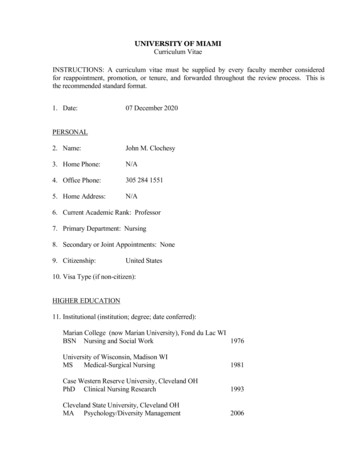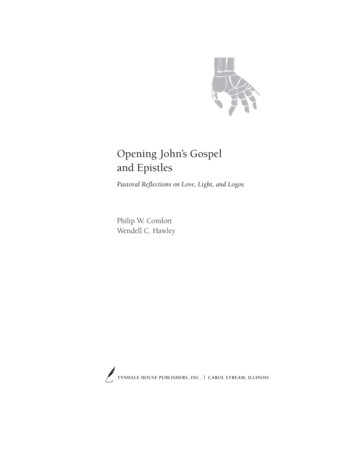
Transcription
CURRICULUM VITAEPeter John TaylorProfessor, College of Education and Human DevelopmentDirector, Graduate Program in Critical & Creative ThinkingDirector, Program on Science, Technology & ValuesUniversity of Massachusetts, Boston, MA 02125, USA617-287-7636 (o); 7656 (fax); Email: peter.taylor@umb.eduWWW Site: http://www.faculty.umb.edu/pjtAREAS OF RESEARCH AND TEACHINGCritical Thinking and Reflective Practice, especially aboutInnovation in Teaching, Group Process, and Interdisciplinary CollaborationSocial Analysis of Ecological ChangeSocial Epidemiology and Human Life-course DevelopmentScience in its Social ContextEDUCATIONPh.D., Organismic & Evolutionary Biology, Harvard University, 1985Dissertation: "Construction and turnover in multispecies communities: A critique of approaches toecological complexity"B.Sc.(Hons.), Monash University, Australia, 1975Majors in Biomathematics and ZoologyPOSITIONS HELDGraduate Program Director/Coordinator/Faculty Advisor, Program in Critical & Creative Thinking, Universityof Massachusetts Boston, 1999-2004, 2007-; Coordinator of Science in a Changing World track,2009Professor, 2006-; Associate Professor, 2002-6; Assistant Professor, 1998-2002, University ofMassachusetts BostonVisiting Professor, School of Forestry and Environmental Studies, Yale University, 2003Adjunct Professor, Department of Environmental, Coastal and Ocean Sciences, 2002-4Eugene Lang Visiting Professor for Social Change, Swarthmore College, 1997-98Rockefeller Fellow, Rutgers University, Center for the Critical Analysis of Contemporary Culture, 1996-97Assistant Professor, Cornell University, Program on Science, Technology & Society 1990-91; Departmentof Science & Technology Studies, 1991-97Research Collaborator, Grupo de Estudios sobre Instituciones Agrarias y Recursos Ambientales,Departamento de Economía, Centro de Investigación y Docencia Económicas, Mexico, 1992-97Visiting Professor, Centro de Investigación y Docencia Económicas and Centro de Ecología, U.N.A.M.,Mexico, 1992, 1993Senior Ecologist, Biosystems Analysis, Tiburon, CA, 1989-90
Taylor, cv, p.2Wantrup Fellow in Natural Resource Economics, University of California, Berkeley, 1987-89Guest Lecturer, University of Helsinki & Academy of Finland, 1988Research Associate, Museum of Comparative Zoology, Harvard University, 1985-87Faculty, New School for Social Research, Lang College Science, Technology and Power Program, 1986-87Teaching faculty, Harvard University Summer School, 1986-87Mellon Fellow, Science, Technology & Society, M.I.T., 1985-86Teaching fellow and tutor, Harvard University, Biology, History of Science and the Core Curriculum, 198185Summer Research Associate, Environmental Sciences Division, Oak Ridge National Laboratory, Tennessee,1984Course development consultant, Royal Melbourne Institute of Technology, Australia, Socio-environmentalassessment program, 1982Marine Ecosystems Research Group, Harvard School of Public Health, 1980-82Graduate Research Assistant, Institute of Applied Economic and Social Research, University of Melbourne,Australia, 1978-79Senior Research Assistant, Agriculture Dept., University of Queensland, 1976-77Tutor, Monash University, Australia, Statistics, 1975TEACHING EXPERIENCEUniversity of Massachusetts, BostonThinking, Learning and ComputersProcesses of Research and Engagement (formerly, Practicum)Critical ThinkingScience-in-society [Seminar in Critical Thinking]Action Research for Educational, Professional, and Personal Change (formerly, Evaluation ofEducational Change)Synthesis of Theory and PracticeComputers, Technology and EducationEnvironment, Science, and Society [Critical and Creative Thinking in Science and Technology]Making Sense of Numbers [Seminar in Critical Thinking]Biology in Society: Critical ThinkingPolitics and the EnvironmentScientific and Political Change (formerly, Science, Technology and Public Policy)Epidemiological Thinking and Population Health (formerly, Pathways of Disease and Development:Epidemiological Thinking for Non-Specialists)Reflective PracticeGender, Race, and the Complexities of Science and TechnologyCreative Thinking, Collaboration, and Organizational ChangeCreative ThinkingCognitive PsychologyDesign for Living ComplexitiesChanging Life: Reading the Intersections of Gender, Race, Biology, and LiteratureMathematical Thinking
Taylor, cv, p.3Cornell UniversityBiology and Society: The Social Construction of LifeSocial Analysis of Ecological ChangeInvestigative Research on the Social Impact of ScienceStatistical Analysis for the Life SciencesScience and Social Theory (Themes: Structure & agency; Changing ideas of nature)Ecology and Social Change (Freshman writing seminar)Visualizing the Dynamics of ScienceGraduate student committees and independent studies in History & Philosophy of Science &Technology, Science & Technology Studies, Development Sociology, Professional Studies,City and Regional Planning, Natural ResourcesFaculty Mentor for Graduate student teaching freshman writing seminars, 1992-96.Other courses taught at other Institutions:Ecologists as social criticsInterpreting Nature and Society in the Twentieth CenturySocial Constructions of NatureMaking sense of measurement: A critical introduction to statisticsEvolution: Synthesis and controversy in biologyCritical Scholarship and Practice in Conservation and DevelopmentGRANTS, FELLOWSHIPS & AWARDSInternational Society for History, Philosophy and Social Studies of Biology, Off-Year Workshop designationand Graduate Student funding for New England Workshop on Science and Social Change, 2014Fulbright Scholar, Portugal, 2012Office of International Transnational Affairs, University of Massachusetts, Boston, Faculty Study AbroadGrant, 2011Visiting Fellowship, Konrad Lorenz Institute for Evolution and Cognition Research, Altenberg, Austria, 2008& 2010Chancellor's Award for Distinguished Teaching, University of Massachusetts, Boston, 2009NSF Grant, “The Implications of Heterogeneity for the Philosophy, History, Sociology, and Science ofBiological Determinism” (PI, 17,755), 2006-9NSF Grant, “Ecological Research and the Complexities of Participation in Social and Environmental Change”(PI, 14,400), 2005-9NSF Grant, “New England Workshop on Science and Social Change” (PI, 6,000), 2004-5NSF Grant, “Genes, Gestation, and Life Experiences: A Critical Comparison of Concepts and Methods Usedin Analyses of Biosocial Development” (PI, 71,670), 2003-5Visiting Scholar, Pembroke Center for Teaching and Research on Women, Brown University, 2002-03.Instructional Technology Center, Senior Fellowship, University of Massachusetts Boston, 2002.Public Service grant, University of Massachusetts Boston, 2001.
Taylor, cv, p.4Healy grant for Proposal Development, University of Massachusetts Boston, 2000.Faculty Seminar Participant, Center for Improvement of Teaching, University of Massachusetts Boston,1999.STEMTEC grant for Science in Society workshops, 1999.Visiting Fellowship, Agrarian Studies Program, Yale University, 1998 (declined)Rockefeller Fellowship, Center for Critical Analysis of Contemporary Culture, Rutgers University, 1996American Council of Learned Societies, International Travel Award, 1995Summer travel grants, Cornell International Institute for Food Agriculture and Development, 1992, 1993Hewlett Fund, Cornell Center for Environmental Research, Seed Grant for Program on Social Analysis ofEnvironmental Change, 1990Visiting Lectureship, Academy of Finland, 1988Wantrup Fellowship, University of California, Berkeley, 1987, 1988National Research Council nominee to the 8th International Congress for Logic, Methodology & Philosophyof ScienceMellon Fellowship, Science, Technology & Society Program, M.I.T., 1985Harvard University Committee on Undergraduate Education, Certificate of Distinction in Teaching, 1985Summer Research Fellowship, Oak Ridge National Laboratory, 1984PROFESSIONAL ACTIVITIESUniversity of Massachusetts, Boston:Critical & Creative Thinking Program, Graduate Program Director/Coordinator, 1999-2004, 2007Admissions Committee, 1998-2005; 2009Coordinator, "Science in a Changing Word" track, 2009Organizer of "Critical and Creative Thinking in the Workplace" Workshops/Course, 2001Organizer of "Critical and Creative Thinking in Practice" Forum and Workshops, 1999-2004Co-organizer of "Critical and Creative Thinking Network" monthly events and online social network,2007Search Committee for staff and faculty positions, 2009, 2014Editor, Working Papers in Critical, Creative, and Reflective Practice, and in Science in a ChangingWorldCurriculum & Instruction Department, (Co-)coordinator/director, Learning, Teaching and EducationalTransformation (non-licensure) M.Ed. track, 2008-12Departmental Curriculum Committee, Co-chair, 2007-8Chair 2006-7, Associate Chair 2007Executive Committee 2005-6Personnel Review Committees, 2005- (incl. Chair 2005, 08-10, 14, 15)Search Committee for faculty positions, 2001, 2004, 2005-6, 2010-11Departmental Annual Faculty Review Sub-Committee, Chair 1999-2000, 2013-14; Member 19992000, 2007-8Organizer, Brown bag series, 2008College of Education and Human Development (formerly: Graduate College of Education)PMYR Review Committee, 2019
Taylor, cv, p.5Promotion Review Committee, External member, 2013College Personnel Committee, 2002-4, 08-10, 12-13; Chair 2003; Co/chair 2008-10Academic Affairs & Curriculum Committee, Chair 2000-2, 2005-6MEET Educational Technology Fellow, 2001-2Dean's Task Force on Educational Technology, 2000-2College of Advancing and Professional StudiesSteering Committee, 2013-15, 2018College Personnel Committee, chair, 2014Curriculum Committee, 2013-2015UniversityFaculty Staff Union representative on Academic Technology Committee, 2018SSRC grant on “Transdisciplinary research,” Proposal review committee member, 2017Public Policy Ph. D. Program, Associate member, 2004-; Academic Affairs Committee, 2008-11;12-16; Admissions Committee, 2017Strategic Plan Implementation committee on Quality of Graduate Programs, 2016Graduate Writing Center working group, 2013-14; Workshop designer & leader: “Supportingstudents’ writing development throughout the graduate curriculum,” 2014NEASC Self-study group on Faculty, 2013-4Selection Committee, Assistant Dean, Graduate Studies and Admissions, 2013Selection Committee, Chancellor's Award for Distinguished Teaching, Chair 2010Science, Technology, and Values Program, Advisory Board, 1998-; Assistant to Director, 2002-3;Director, 2004Inter-college faculty Seminar in Humanities and Sciences (semester-long thematic seminars),Organizer, 2003Faculty Council, Budget and Planning Committee, 2009-10Environmental Studies program, Advisory Board, 2004-8 (co-chair, 2006-7)Environmental Council, 2002-4Chancellor's Committee on Sustainability, Chair, Sub-committee on "Infusing Sustainability into theCurriculum," 2002-5; Co-organizer, Faculty development workshops, 2003.Provost's Task Force on Environmental Affairs, 2000Co-chair of site-visit and proposal group that secured Ford Foundation funding for a New EnglandCenter for Inclusive Teaching (NECIT), 2002Committee to establish General Science Degree, 1999Committee to establish M.Ed. in Science & Math. Teaching, 1998-99Organizer/leader of workshops, "Science-in-Society, Society-in-science," "Helping Each Other toFoster Critical Thinking about Biology and Society," "New Directions in Science Education,""Helping Each Other to Foster Critical Thinking about Environment, Science, and Society,"1998-2002Beyond the Campus:Science as Culture, editorial board, 1997-2018; associate editor, 2018-; guest co-editor for special editionon "Ecological science and Environmental Politics," 1997-98; guest editor for Forum on “Fromradical science to STS.”Society for Social Studies of Science: Organizer of sessions “Lives in STS ‘as a series of failed politicalexperiments’” 2018; “Heterogeneity and heritability: Responses from sociology, philosophy, andhistory of science" 2006; "Representing and engaging with unruly processes" 2005; “Interpretingresearch on the complexity of changing disease patterns,” 2004; "Social interactions in theproduction of epidemiology," 2002; "Ecological politics as cultural discourse," 1998.Organizer, New England Workshop on Science and Social Change, 2003-; Workshops on “Complexities ofenvironment and development in the Age of DNA,” 2004; “How complexities of the socialenvironment shape the ways that society makes use of knowledge about 'genetic' conditions,”2005, “Ecological restoration as social reconstruction,” 2006; “Collaborative generation ofenvironmental knowledge and inquiry,” 2007; “Science-in-society: Teaching and engaging acrossboundaries,” 2008; "Heterogeneity and Development: Methods and Perspectives from Sciences
Taylor, cv, p.6and Science Studies," 2009; "Where social theory meets critical engagement with the productionof scientific knowledge," and "Problem- and case-based learning about biology-in-society," 2010;"Open Spaces for Changing Science and Society,” 2011; "Open Spaces for Scientific and SocialChange II: Support for Translation,” 2012; “Scaffolding Scientific and Social Change,” 2013;“Changing Life in Times of Crisis,” 2014; “Fostering Critical Thinking and Reflective Practice inTimes of Crisis,” 2015; “Impossible to Simply Continue Along Previous Lines: Changing Life inTimes of Crisis,” 2016 & 2017 & 2018; “Intersecting Processes” and “Making Spaces forConnecting, Probing, Reflecting, Creating,” 2017External Review panels: Member, State of Connecticut Reaccreditation for The Graduate Institute, April2017; Chair, Proposal for M.A. degree in Critical and Creative Thinking, University of Nebraska,November 2014.Workshop designer and facilitator, “Design for Living Complexities,” RMIT and Macquarie Universities,Australia, October 2016, “Making Sense of our 4S Experiences: An hour for Connecting andReflecting Together,” Society for Social Studies of Science, September 2016, “CollaborativeReflection & Prospect Formation in the area of critical & creative thinking,” UMass Boston, July2014; “What is a studio or what could it be,” RMIT University, Australia, August 2013; “Design forLiving Complexities: Bringing critical thinking into design practice,” University of Wollongong,Australia, August 2013; “6-minute MOOC,” UMassBoston Center for Innovative TeachingConference, May 2013 (with J. Szteiter & F. Sullivan); “Creativity and Innovation in EpidemiologicResearch,” American College of Epidemiology, Chicago, September 2012; Cancer Care Ontario,January 2013; "Biology in Society: Critical thinking and refractive practice" at IBMC in Porto,Portugal; “Troubled by Heterogeneity?” University of Coimbra, Portugal, November 2012;“Collaborative production of knowledge: Health, environment, and publics,” University of Coimbra,Portugal, May 2011.“Ethics of participatory processes,” Discussion group facilitator, Cary Conference on “Linking Ecology andEthics for a Changing World: Values, Philosophy, and Action,” Millbrook, NY, May 2011.“When the Social, not the Medium, is the Message: A Workshop on Community-building and ResearchCollaboration in Virtual Spaces,” Workshop co-organizer, University of Massachusetts Boston, April2011.“Changing Research, Teaching and Society,” Workshop facilitator, University of Wollongong, Australia,February 2011.Workshop Participant to develop a Research Collaborative Network in Undergraduate Biology Education,Emory University, May 2010Visiting Theorist, Center for Drug Use and HIV Research, National Development and Research Institutes,New York, January 2009"Democracy and its Critics," short course, American Political Science Association, Boston, August 2008,guest facilitatorAdvisory Board, UMass Lowell Center for Sustainable Production, 2006; Invited participant in Facultyseminar on “Responsible Development of Emerging Technologies,” 2008.External Evaluating Committee for “Management of Ecosystems and Human Development” Megaproject ofUNAM (National Autonomous University of Mexico), 2005-7Handbook of Ecological Concepts, Invited international workshop participant, 2002, 2006; Editorial BoardExternal doctoral examiner, University of Newcastle, Australia, 2004
Taylor, cv, p.7Workshop leader & consultant, Global Perspectives Curriculum Development Project, Mt. Mary College,2004.Invited Facilitator/Participant, Middle East Environmental Futures Project, Brown University, July 2003Pembroke Center Seminar on Theories of Embodiment, Brown University: Workshop leader, December2002External reviewer, Centre for Social Studies at the University of Coimbra, Portugal, 2002Massachusetts Board of Higher Education and the Dwight D. Eisenhower Professional DevelopmentProgram in the South River/South Coastal Watershed, Co-PI 2000-1 and Workshop leader,November 2000, May 2001.International Society for History, Philosophy and Social Studies of Biology:Past-President, 1997-99Education Committee, Chair, 1997-2001; Member 2001-5Marjorie Grene Prize Committee, Chair, 2005-7; Member; 2007-9Operations Committee, 2009-13Organizer or co-organizer of sessions: "Genes, Gestation, and Life Experiences: Perspectives onthe Social Environment in the Age of DNA" in 1999; “Teaching History, Philosophy, and SocialStudies of Biology” pre-conference workshop in 2001; "Knowing, Interpreting and Engaging withNew and Old Biocomplexities" in 2005.Association for Supervision and Curriculum Development, Panel Member, "Teaching Thinking: LookingBackwards, Looking Forwards," March 2001; Teaching for Thinking Network Board member 20014.NSF Workshop on a Research Agenda for Linking Ecological and Economic Systems, Tempe, InvitedParticipant, June 2000.University of Tampere, Finland, International Collaborator, "How does nature speak?" project, 1996-;Workshop facilitator, 2000.Local Knowledge and Global Consequences Workshop, Harvard School of Government, InvitedCommentator, April 2000.National Center for Ecological Analysis and Synthesis, Workshop on "Rethinking the Human-NatureBoundary," Invited participant, March 2000.BioQuest workshop on Teaching College Biology, Invited Presenter and Participant, June 1999, 2002.Massachusetts Board of Higher Education, Honors Faculty Development Workshop, Invited WorkshopLeader, June 1999.International Communication Association, Invited Commentator, Workshop on "Sense-Making: Methodologybetween the cracks," May 1999."Changing Life" (working group on fostering critical thinking about life and environmental sciences);Convenor, 1999Centro Regional de Investigaciones Multidisciplinarias, U.N.A.M., México: Consultant and Commentator ondevelopment of doctoral program in "Society, Enviroment, and Sustainability," November 1998.Swarthmore College: convenor of study group, "New biology: Old and new questions," 1997-98; organizer,international workshop, "How can we help each other with 'agency'?," April 1998.
Taylor, cv, p.8Columbia University, member of University Seminar on "Ecology and Culture," 1997-98.Environment and History, guest co-editor for special edition on "The politics of the conservation of nature,1995-97.Social Text, guest collaborating editor, special section of no. 42, on "Science studies," 1994-95.Biology and Philosophy, guest editor of special issue on "Pictorial Representation in Biology," 1989-91History of Science Society: Organizer of "Human ecologies: New perspectives" session at the 1993meetings.American Sociological Association, Section on Scientific Knowledge and Technology: Council Member1993-96; Returning Officer 1994; Prize Committee 1994-95; Co-organizer of "Science,Technology, Work organization & Global restructuring" session, 1995.Reviewer:Acta Biotheoretica; American Journal of Psychiatry; American Naturalist; American Psychologist;Biology & Philosophy; Bioscience; Ecological Complexity; Ecological Economics; EcologicalModelling; Ecology; Environmental Humanities; Environment and History; Genetics &Epigenetics; Geoforum; Global Ecology & Biogeography; Ideas in Ecology and Evolution;Journal of Integrative Environmental Sciences; Pedagogies: An International Journal;Philosophy, Theory, and Practice in Biology (formerly Philosophy and Theory in Biology);PLOS One; Policy & Internet; Psychosis; Public Understanding Of Science; Science; Scienceas Culture; Science Education; Science in Context; Science Studies; Science, Technology &Human Values; Social Epistemology; Social Studies of Science; Societies Without Borders;Society and Natural Resources; Subjectivity; Synthese; Theoretical Population Biology,Transactions of the Institute of British GeographersHackett Publishing; Harvard University Press; Routledge; Sage; SUNY Press; Brooks/Cole; MIT Press;University of Colorado Press; Columbia University PressNational Science Foundation; National Endowment for the HumanitiesInternational Conference on System Sciences; Konrad Lorenz Institute; Medicine 2.0; TheNetherlands Organisation of Health, Research and DevelopmentMembership in Professional Societies:International Society for History, Philosophy and Social Studies of BiologySociety for Social Studies of SciencePUBLICATIONS(* indicates primary author/editor other than PJT; # indicates equal joint authorship/ editorship)BooksTaking Yourself Seriously: A Fieldbook of Processes of Research and Engagement. Arlington, MA: ThePumping Station, 2012, 2nd edition 2019 (with Jeremy Szteiter)The Truth is the Whole: Essays in Honor of Richard Levins. Arlington MA: The Pumping Station, 2018 (ed.with T. Awerbuch, M. Clark#)Ann(ie) Blum in Our Lives. (editor) Arlington, MA: The Pumping Station, 2016.Nature-Nurture? No. Moving the Sciences of Variation and Heredity Beyond the Gaps. Arlington, MA: ThePumping Station, 2014.Unruly Complexity: Ecology, Interpretation, Engagement. Chicago: University of Chicago Press, 2005.Changing Life: Genomes, Ecologies, Bodies, Commodities. Minneapolis: University of Minnesota Press (ed.with S. Halfon & P. Edwards), 1997.
Taylor, cv, p.9Articles“Critical Epidemiological Literacy: Understanding Ideas Better When Placed in Relation to Alternatives,”Synthese, in press, DOI: 10.1007/s11229-018-01960-6.“The role of distributed health literacy in asthma integrated care: A public medical context from Portugal,”International Journal of Integrated Care, 18:18, https://doi.org/10.5334/ijic.3301 (with L. Abreu,J.Nunes, S. Silva *)“From Complexity to Construction to Intersecting Processes: Puzzles for theoretical and social inquiry,”Ecological Complexity, 35:76-80, 2018."Distributed health literacy among people living with type 2 diabetes: defining levels of awareness andsupport,” Journal of Health & Social Care in the Community (with L. Abreu, J.Nunes, S. Silva *),26(10): 90-101, 2018.“The genotype/phenotype distinction,” Stanford Encyclopedia of Philosophy (with R. ype-phenotype/, 2017.“Distinctions that make a difference? (An essay review of Beyond versus: The struggle to understand theinteraction of nature and nurture by J. Tabery),” Studies in History and Philosophy of Biologicaland Biomedical Sciences, Part C, 51: 70-76, 2015.“Ecological Philosophy,” Oxford Bibliographies in Ecology (http://www.oxfordbibliographies.com/), 2015.“A gene-free formulation of classical quantitative genetics used to examine results and interpretationsunder three standard assumptions,” Acta Biotheoretica, 60(4): 357-378, 2012."Cultivating Collaborators: Concepts and Questions Emerging Interactively From An Evolving,Interdisciplinary Workshop" (with S. Fifield and C. Young), Science as Culture, 20(1): 89-105,2011."Biology as Politics: The Direct and Indirect Effects of Lewontin and Levins (An essay review of BiologyUnder the Influence: Dialectical Essays on Ecology, Agriculture, and Health)," Science as Culture,19(2): 241-253, 2010.“Three puzzles and eight gaps: What heritability studies and critical commentaries have not paid enoughattention to,” Biology & Philosophy, 25:1-31, 2010."Why was Galton so concerned about 'regression to the mean'?—A contribution to interpreting andchanging science and society" DataCritica, 2(2): 3-22, 2008 (http://bit.ly/DataCritica2 1 1)“Nothing Reliable about Genes or Environment: New Perspectives on Analysis of Similarity Among Relativesin Light of the Possibility of Underlying Heterogeneity," Studies in History and Philosophy ofBiological and Biomedical Sciences, 40(3): 210-220, 2009."Infrastructure and Scaffolding: Interpretation and Change of Research Involving Human GeneticInformation," Science as Culture, 18(4): 435-459, 2009.“The under-recognized implications of heterogeneity: Opportunities for fresh views on scientific,philosophical, and social debates about heritability," History and Philosophy of the Life Sciences,30: 431-456, 2008.“The Unreliability of High Human Heritability Estimates and Small Shared Effects of Growing Up in theSame Family,” Biological Theory, 2(4): 387-397, 2007.
Taylor, cv, p.10"Guidelines for ensuring that educational technologies are used only when there is significant pedagogicalbenefit," International Journal of Arts and Sciences, 2(1): 26-29, 2007.“Heritability and heterogeneity: The irrelevance of heritability in explaining differences between means fordifferent human groups or generations,” Biological Theory, 1(4): 392-401, 2006."The analysis of variance is an analysis of causes (of a very circumscribed kind)," International Journal ofEpidemiology, 35: 527-531, 2006.“Heritability and heterogeneity: The limited relevance of heritability in investigation of genetic andenvironmental factors,” Biological Theory, 1(2): 150-164, 2006."What can we do? -- Moving debates over genetic determinism and interactionism in new directions,"Science as Culture, 13 (3): 331-355, 2004."Situatedness and Problematic Boundaries: Conceptualizing Life's Complex Ecological Context," Biology &Philosophy, 16 (4):521-532, 2001. (with Y. Haila)"The Philosophical dullness of classical ecology, and a Levinsian alternative," Biology & Philosophy, 16 (1),93-102, 2001. (with Y. Haila*)"Socio-ecological webs and sites of sociality: Levins' strategy of model building revisited," Biology &Philosophy, 15 (2), 197-210, 2000."How does the commons become tragic? Simple models as complex socio-political constructions" Scienceas Culture, 7 (4), 449-464, 1998."Natural Selection: A heavy hand in biological and social thought," Science as Culture, 7 (1), 5-32, 1998.Reprinted as "La selección natural: Un lastre sobre el pensamiento biológico y social," LudusVitalis, 7 (12), 27-55, 2000."Building on construction: An exploration of heterogeneous constructionism, using an analogy frompsychology and a sketch from socio-economic modelling" Perspectives on Science, 3(1), 66-98,1995."The social analysis of ecological change: From systems to intersecting processes" Social ScienceInformation, 34: 5-30, 1995. (With R. García-Barrios) Also published, slightly modified, as "Elanalisis social del cambio ecológico, El medio ambiente: Una perspectiva económica social" pp. 6793 in J. Jardon (ed.). Recursos, Energia y Cambio Social. Mexico: Plaza y Valdez Editores, 1995."How do we know we have global environmental problems?: Science and the globalization of environmentaldiscourse" Geoforum, 23: 405-416, 1992. (With F. Buttel)"Environmental sociology and global environmental change: A critical assessment" Society and NaturalResources, 5:211-230, 1992 (With F. Buttel*) Revised version, pp. 228-255 in M. Redclift & T.Benton (eds.) Social Theory and the Global Environment, Routledge, 1994."Ecosystems as circuits: Diagrams and the limits of physical analogies" Biology & Philosophy, 6:275-294,1991. (With A. Blum)"Revising models and generating theory" Oikos 54:121-126, 1989."Technocratic optimism, H.T. Odum and the partial transformation of ecological metaphor after World War2" J. Hist. Biol. 21:213-244, 1988.
Taylor, cv, p.11"The construction and turnover of complex community models having Generalized Lotka-Volterradynamics" J. Theor. Biol. 135:569-588, 1988."Consistent Scaling and Parameter Choice for Linear and Generalized Lotka-Volterra Models Used inCommunity Ecology" J. Theor. Biol. 135:543-568, 1988."Historical versus Selectionist Explanations in Evolutionary Theory" Cladistics 3: 1-13,1987."Dialectical Biology as Political Practice. An essay review of R. Levins & R. Lewontin The DialecticalBiologist," Radical Science 20: 81-111, 1986 ( L. Levidow (ed.) Science as Politics, FreeAssociation Books)Book chapters"The hidden complexity of simple models, or Why theorists of all kinds should be troubled by unmodeledvariables having dynamical lives of their own,” pp. 180-200 in T. Awerbuch, M. Clark, P. Taylor(eds.) The Truth is the Whole: Essays in Honor of Richard Levins, Arlington MA: The PumpingStation, 2018.“Changing Science in Heterogeneous Environments,” pp. 87-101 in T. Awerbuch, M. Clark, P. Taylor (eds.),The Truth is the Whole: Essays in Honor of Richard Levins, Arlington MA: The Pumping Station,2018.“Nature and Nurture,” in N. Castree, M. Hulme and J. Proctor (Eds.) The Companion to EnvironmentalStudies. London: Routledge, 2018.“Bringing All to the Table: From the Pumping Station to Project-Based Learning,” pp. 427-439 in C.Winslow (Ed.) River of Fire: Commons, Crisis, and the Imagination. Arlington MA: The PumpingStation, 2016.“The ethics of participatory processes: Dynamic flux, Open questions,” pp. 325-337 in Rozzi, R., Pickett, S. T. A.,Callicott, J. B., Chapin, F. S., Power, M. E., & Armesto, J. J. (Eds.). Earth Stewardship: Linking Ecology andEthics in Theory and Practice. Springer, 2015."Philosophy of Ecology," eLS (Encyclopedia of Life Sciences). Chichester: Wiley, http://www.els.net/ [DOI:10.1002/9780470015902.a0003607.pub3. (Revised version of 2008 entry), 2015.“Case study: Collaborative explorations,” The Peeragogy Handbook, http://peeragogy.org, 2013.“Conceptualizing the heterogeneity, embeddedness, and ongoing restructuring that make ecologic
of Massachusetts Boston, 1999-2004, 2007-; Coordinator of Science in a Changing World track, 2009- Professor, 2006-; Associate Professor, 2002-6; Assistant Professor, 1998-2002, University of Massachusetts Boston Visiting Professor, School of Forestry and Environmental Studies, Yale University, 2003
